The Khattak, is a Pashtun tribe numbering over 3 million, which speaks a variant of the softer Kandahari Pashto. It is one of the oldest Pashtun tribes. The Khattaks are settled along the western bank of the Indus River from as north upwards as Lund Khwar, Katlang, Sawaldher, Sher Garh and near Malakand, Nowshera District, Kohat District, Mianwali District, Attock District & Karak District in Pakistan. Across the Durand line, a smaller number of Khattaks are scattered in Kandahar, Ghazni, Logar and Khost in Afghanistan. The historic capitals of the Khattaks were Teri, a town at District Karak, and Akora Khattak, a town at District Nowshera.

The Afrīdī is a Pashtun tribe present in Pakistan, with substantial numbers in Afghanistan. The Afridis are most dominant in Pakistan's Federally Administered Tribal Areas, inhabiting about 100p mi² (3000 km²) of rough hilly area in the eastern Spin Ghar range west of Peshawar, covering most of Khyber Agency, FR Peshawar and FR Kohat. Their territory includes the Khyber Pass and Maidan in Tirah. Afridi migrants are also found in India, mostly in the states of Uttar Pradesh, Bihar and Jammu and Kashmir.
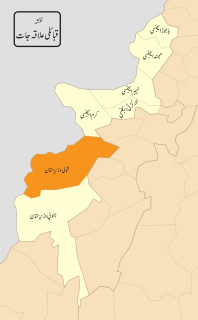
North Waziristan District is a former agency of defunct Federally Administered Tribal Area and now a district in Bannu Division of Khyber Pakhtunkhwa province in Pakistan. It is the northern part of Waziristan, a mountainous region of northwest Pakistan, bordering Afghanistan and covering 4,707 square kilometres (1,817 sq mi). The capital city of North Waziristan is Miramshah.
The Zazi, also spelled Zazai, or Jaji, is a Karlani Pashtun tribe. They are found in Paktia and Khost provinces in the Loya Paktia region of southeastern Afghanistan, as well as Kurram Valley of Pakistan, but also have an effective presence in Kabul, Logar, Ghazni, Nangharhar, Kunduz, and Baghlan in Afghanistan.

The history of Balochistan began in 650 BCE with vague allusions to the region in Greek historical records. Balochistan is divided between the Pakistani province of Balochistan, the Iranian province of Sistan and Baluchestan and the Afghan region of Balochistan. Prehistoric Balochistan dates to the Paleolithic.
The Miranzai Valley, also Hangu, is a mountainous valley situated in the Kohat and Hangu districts in the North-West Frontier Province of Pakistan. It is made up of two valleys, draining from the southwest into the Kurram and northeast into the Kohat Tai. It is divided into upper and lower Miranzai. It extends from the Bangash and Orakzai hills to the Bangashs. It is 40 miles (64 km) in length and is 546 square miles (1,410 km2) in area. East of Hangu there are numerous smaller valleys; west of Hangu, consisting of all of the upper portion of the valley, there is a broad and open plain, bare of trees. There are many ravines in this and the surrounding area, with many inhabitants, predominantly the Bangash and Orakzai peoples.

Orakzai District is a district in Kohat Division of Khyber Pakhtunkhwa province in Pakistan. Until 2018, it was an agency of Federally Administered Tribal Areas. With the merger of FATA with Khyber Pakhtunkhwa, it became a district. Before to 1973, it was part of FR Kohat.
The Turi or Torai are a sub-tribe of the Karlani Pashtun tribe, inhabiting the Kurram Valley, in Kurram Agency in the Federally Administered Tribal Areas of Pakistan, with a smaller number living across the Durand line in the Paktia province of Afghanistan. They speak Pashto and are adherents of the Twelver Shia sect of Islam.
Bāyazīd Pīr Rōshān or Pīr Rōkhān was a Pashtun warrior, poet, and revolutionary leader from Kaniguram, Waziristan. He wrote mostly in Pashto, but also in Persian, Hindustani, and Arabic, while he also spoke Ormuri. He is known for founding the Roshani movement, which gained many followers in the Pashtunistan region and produced numerous Pashto poets and writers. Pir Roshan created a Pashto alphabet, derived from the Arabic script with 13 new letters. A modified version of this alphabet continues to be used to write Pashto. Pir Roshan wrote Khayr al-Bayān, one of the earliest known books containing Pashto prose.
The Mahsud or Mehsud, also spelled Maseed, is a Karlani Pashtun tribe inhabiting mostly the South Waziristan Agency in Federally Administered Tribal Areas of Pakistan. A minor number of Maseed lineages are settled in the Logar Province of Afghanistan, especially in Charkh District, Baraki barak and Muhammad Agha, but also in Wardak, Ghazni and Kunduz Provinces. The Maseeds inhabit the center and north of South Waziristan valley, surrounded on three sides by the Darweshkhel Wazirs, and being shut off by the Bettanis on the east from the Derajat and Bannu districts. Two Pashtun tribes, the Ahmadzai Wazirs and the Maseeds, inhabit and dominate South Waziristan. Within the heart of Maseed territory in South Waziristan lies the influential Ormur (Burki) tribe's stronghold of Kaniguram. The Ormurs are considered by other tribes of South Waziristan to be close brethren of the Maseeds due to marital and other ties and the fact that the Ormurs have lived in and controlled Kaniguram for over a thousand years. There are also some Maseeds living in the UAE, Germany and the United Kingdom.
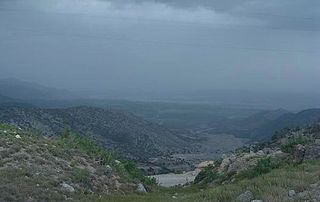
Kurram District is a district in Kohat Division of Khyber Pakhtunkhwa province in Pakistan. Until 2018, it was an agency of Federally Administered Tribal Areas, with merger of FATA with Khyber Pakhtunkhwa, it became a district. Geographically, it covers the Kurram Valley region which is a valley in the northwestern part of Pakistan. Most of the population is Pashtun and the main religion is Islam. Major tribes living in Kurram Agency are Turi, Bangash, Mamozai, Muqbal, Orakzai, Zazai (JAJI), Mangal, Ghilzai and Para Chamkani.
The Mangal is a Pashtun tribe, residing in eastern Paktia and adjacent Khost provinces of Afghanistan, and in the town of Tari Mangal, district Kurram, Pakistan. Their land constitutes the northeastern part of the Loya Paktia region. The Mangals descent from Karlani Pashtun lineage.
Alizai is a Pashtun tribe indigenous to southern Afghanistan and Southern Pakistan. It belongs to the Panjpai confederation of the larger Durrani tribe of Ahmad Shah Durrani. The Alizai Pashtuns are usually bilingual in Pashto and Persian. Sardar Shahzaman Khan Alizai is the chieftain of Alizai tribe. He resides in Mastung, Balochistan. He is the elder son of late Sardar Mir e Aab Mohim Khan Alizai a well known respected personality of Balochistan.
Naryab(نرياب) is a town and union council of Hangu District in Khyber Pakhtunkhwa, Pakistan.
It is an old village of the Kohat Division and there is a Small Dam in upper area of Naryab by which the farmers of that village irrigate their farms.
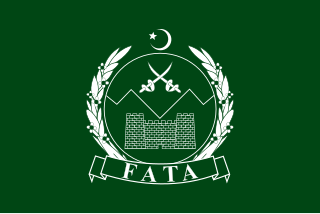
The Federally Administered Tribal Areas was a semi-autonomous tribal region in northwestern Pakistan that existed from 1947 until being merged with neighboring province Khyber Pakhtunkhwa, in 2018. It consisted of seven tribal agencies (districts) and six frontier regions, and were directly governed by Pakistan's federal government through a special set of laws called the Frontier Crimes Regulations. It bordered Pakistan's provinces of Khyber Pakhtunkhwa and Balochistan to the east and south, and Afghanistan's provinces of Kunar, Nangarhar, Paktia, Khost and Paktika to the west and north. The territory is almost exclusively inhabited by the Pashtun, who also live in the neighbouring provinces of Khyber Pakhtunkhwa and Northern Balochistan, and straddle across the border into Afghanistan. They are mostly Muslim.
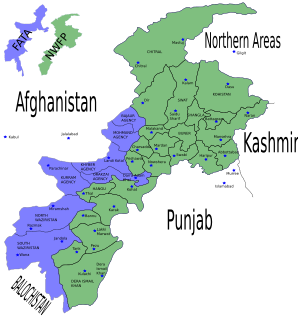
In January 1505, Babur set out from Kabul towards India and proceeding by way of Badam Cheshmeh and Jagdalak reached Adinapur (Jalalabad). Nasir Mirza, his younger brother, joined him here. As the Aimaqs of that neighborhood with their followers had moved down with all their families into Lamghanat for the purpose of wintering there, they waited for this group and others till they were joined by them after which the army went on to Kush Gumbez lower down than Jui Shahi. Nasir Mirza having made some provision for his dependents and followers from the country under his government stayed behind at Kush Gumbez promising to follow in two or three days.
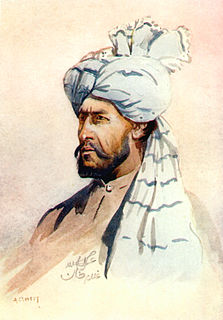
The Kurram Militia is a unit of the Frontier Corps of the paramilitary forces of Pakistan. It was originally raised by the British in 1892 to operate in the North-West Frontier Province, and carried in that role following Pakistan's independence in 1947.










